Hand of Death (1976)
Directed by: John Woo
Written by: John Woo
Starring: Dorian Tan, Jackie Chan, James Tien, Sammo Hung
AKA SHA LIN MEN, SHAOLIN GATE, STRIKE OF DEATH, COUNTDOWN TO KUNG FU
Hong Kong
AVAILABLE ON BLU-RAY: June 24th, from EUREKA ENTERTAINMENT, in the ‘LAST HURRAH FOR CHIVALRY/HAND OF DEATH: TWO FILMS BY JOHN WOO’ BOXSET
RUNNING TIME: 96 mins
REVIEWED BY: Dr Lenera, Official HCF Critic
It is the time of the Qing dynasty in China with Manchu invaders in charge, and Shaolin martial arts is just the kind of thing that they see as a danger and want to stop. Shaolin student Yunfei is given the weighty task of avenging the death of a Shaolin master by killing disciple-turned-traitor Shih Shao-Feng. As if that wasn’t enough, he’s also assigned to find and help escort scholar Cheng who’s carrying military secrets that will help the rebellion overthrow the repressive government. Along the way, Yunfei meets uneducated but kindly woodsman/blacksmith Tan, as well as The Wanderer, an expert but discredited swordsman….
I haven’t kept my promise of a Jackie Chan film review a month that I made some time ago, but at least I can give you one now [which shamefully I’d never seen before either even though it’s always been easily available] even though Chan doesn’t have the lead role in this particular film and doesn’t appear much onscreen until the final quarter. The fact that Eureka have listed it after Last Hurrah For Chivalry in titling their new boxset, despite it having been made three years before, maybe indicates that it’s considered to be the lesser of the two films and that the 1979 title is the main attraction. And indeed it’s neither as good nor as interesting. While Last Hurrah For Chivalry was so full of Woo’s style and themes that it was almost a ‘heroic bloodshed’ movie with swords, you’d probably be hard put to recognise Hand Of Death as a Woo film at all. It has the odd touch or element here and there that will make fans smile, but if you didn’t know it was from this filmmaker then I doubt that the name of Woo would be one that cropped up in your head. However, it’s still a solid traditional kung fu film in its own right, with certain bits and pieces that fans will love, even if it’s nowhere near being a classic and is overall a little disappointing considering that it has the legends that are Woo, Chan, Sammo Hung and Yuen Biao all working together in one film!
Hand Of Death was Woo’s second directorial effort after The Dragontamers. Chan had already been the lead in Snake Fist Fighter, but after that settled for a few supporting roles, the real star here being Dorian ‘Flashlegs’ Tan who for a while was one of many Bruce Lee impersonators in the genre, called Bruce Liang. According to some, Chan’s role was originally intended for a South Korean actor, but Woo thought the South Korean was too old and slow, and so he fired him and brought in Chan instead. However, this story has been contradicted by Sammo Hung, who says that Chan was in it from the beginning, as has the claim that the script was altered to expand Chan’s part. This was the first film where Chan worked with his Peking Opera childhood buddies Hung and Biao, though they don’t share any scenes together. Hung also worked as fight choreographer and stunt co-ordinator, while Biao also performed much of the stunt work, including doubling for Tan. The first of Chan’s mishaps occurred on the set of this movie. When doing a stunt that involved him jumping off a hidden truck onto a trampoline with a wire that was supposed to pull him back, Chan lost his balance, and when the wire pulled him he bashed his head on the side of the truck. Chan being Chan, instead of taking a break he immediately did it again and then passed out for half an hour, causing Woo and others thinking that he was going to die. The film disappointed commercially, as did all of Woo’s early films.
So as with many of these films, we’re in a time when the art of Shaolin martial arts is in considerable danger, and open with an attack on a Shaolin temple, most of the monks being shot dead with arrows while the abbot is hung. The funky main theme that plays over the main titles sounds like it would be more appropriate for a modern day-set [or should I say a ‘70s-set] film, and then our hero gets to show off his prowess with the sword, the staff, and no weapons at all. This is all a test, but he passea it so he can be the one to avenge the abbot and kill disciple-turned-traitor Shih Shao-Feng, and also locate this Cheng and take him to safety, and one wonders why they couldn’t have got somebody else to do this seeing as Yunfei already has enough on his plate. As for why Cheng is so important, it’s because he carries with him the map of a garrison, something that’s never mentioned again, it’s just a MacGuffin. Yunfei sets off, and soon encounters Chan, though some may not even recognise him because this film was made before he had eyelid surgery which did make him look a bit different. Chan is a woodsman called Tan, and he helps Yunfei to get past a checkpoint, though the way the scene is done he probably wouldn’t have had much trouble anyway in the first of a few rather clumsily written moments. Inside the town he spies Chiu Kuo, the person who supposedly knows where Chang is, about to be executed. A rescue attempt takes place by Kuo’s friends but it’s a trap and they’re all slaughtered except for Kuo who hides in an inn where Yunfei also is, as well as The Wanderer, a heavy drinking swordsman who’s retired because, as a flashback shows us, Shih caused him to accidentally kill his beloved in a brothel [but after a brief but gratuitous sex scene with a close-up of breast]. Heavy drinking, retired swordsman, brothel – okay, maybe it is rather like Last Hurrah For Chivalry after all!
Yunfei was told to find Ching before he took his revenge, but he can’t wait and promptly gets himself beaten. Shih, despite his powerful White Crane Soul Chasing Fist, is one of those bad guys who just won’t fight fair, battling his opponent for a while before getting his eight master guards, who possess differing weapons and even have in their number a wrestler who prefers to just throw people about, to do the business before taking over again near the end. But in terms of the baddies in this film, your eye will constantly be drawn to Hung and his very prominent pearly white teeth. What makes it so funny is that Hung is visibly struggling with the fake gnashers in many of his scenes. But then James Tien, in a typical villainous role as Shih, sports a very fake moustache and towards the end of the film removes his hat to reveal an even more obvious wig. Now you’re probably wondering where Yuen Biao is in all of this, and actually he’s all over the place playing tiny roles, most visible when he gets killed by an arrow shot right through a target and into him. It’s quite amazing how none of the ‘Three Brothers’ [Chan, Hung and Biao] are visibly in no scenes together. But at least Chan, after us being given no indication that his character can fight, and who we eventually learn is also out for revenge against Shih, is, after an hour, allowed to show what he can do with the spear in two fairly good fight scenes, the second of them having him battle a guy with a flail, though he doesn’t get to fight any of the two main bad guys. Our other two heroes Yunfei and The Wanderer also get a training session which has just a little bit of the male bonding [some go as far as to call it homo-eroticism, though I’ve never thought of it as that, something which probably just makes me naive] that went on to become a major Woo ingredient.
The script by Woo himself has one or two unexpected occurrences, but the way characters tend to show up on cue is daft, and, unlike the considerably more ambitious Last Hurrah For Chivalry, it’s basically designed to join the dots between a few fight sequences and set things up for a final quarter of brawling. Early fights are quite slow so you can tell that the actors knew exactly where the next hit was coming from, but things do improve even if matters never quite attain the heights you want. Tam’s beach fight [Woo likes beach fights] with Hung is a highlight, if partly because of Hung’s obvious willingness to get hurt to make Tan look good, though the battles with Tien don’t quite come off because Tien was really an actor first, a martial artist second, and his skill is rather limited. Therefore it’s hard to believe that his character is in danger of killing or even beating anyone in a fight despite his reasonable acting ability trying to make up the difference. Tan’s punching skill and forms are good though not great, but by god his kicking is glorious to behold, and he also carries out an escape that’s really neat. Despite hanging upside-down and tied at the ankles, Yunfei uses his great body strength to twist his body like a snake, reaching up to untie the knots with his teeth, before landing on Chan, who then crawls with the other guy on his back in an early bit of Chan comedy. As an actor though, while not bad, he doesn’t quite have the charisma that some of the other cast members have in spades. Meanwhile Woo himself plays Chang, a role which doesn’t require him to fight, and he’s quite good if no more.
The camera sometimes lets us view the action from high angles. In fact the cinematography from Yung-Chi Liang is often pretty good, with some nice slow countryside tracking shots, though the zoom lens is very often resorted to. The occasional bit of handheld camerawork or Sergio Leone-style close-ups and cutting just before a fight isn’t quite enough to suggest that the film’s director would go on to have such a strong style, while Joseph Koo’s musical score is firmly in the ‘one size fits all’ mode, with his main theme turning up constantly. I’m probably sounding a bit too negative about Hand Of Death, but that’s the problem with Last Hurrah For Chivalry having been so good. Maybe I should have it reviewed it first after all. It’s still a decent, if hardly remarkable, example of its kind.
Rating: 









As with Last Hurrah For Chivalry, Hand Of Death looks very good in this 2k restoration, and my comments on the release of the former film apply to this one, except that there quite a few out of focus shots, something that’s obviously due to the primitive and hurried nature of the filming rather than any faults in the restoration or Eureka’s encoding. Look out for what suspiciously look like modern streets in the background of one scene though, something that may not been visible in earlier releases of this film!
As before we get one Mandarin and two Cantonese dubs, the mono Cantonese being a bit louder than the stereo, but there are also two English dubs, including – hurray! – the ‘classic’-style ’70s one, so of course I watched the film with the latter with occasional switching over to the other tracks. It’s often hard not to laugh at the voicing, while the recording is shoddy, but who cares, it adds to the fun in my probably heretical opinion. After all, it’s not as if you hear the original voices of the actors on the Chinese dubs either. Kudos to Eureka for locating and using this dub even though technically it falls short of the others.
The only other special features Hand Of Death has previously had are a Woo interview on the French TFi Video DVD and a Bey Logan audio commentary on the CineAsia DVD. Of course Logan is absent, but the Woo interview, which is an overview of his career, is present. Looking like it was made for TV, replete with an irritating device of having Woo show up on a black and white monitor as well as in the picture proper, it has Woo talking about his action [which he says is “emotional” and “has a moral”], and saying how his prime message in his films is getting people to understand each other, while Chow Yun Fat also appears quite a bit, with a nice story how he was allowed to put in a true story from his past into a scene in The Killer. The nature of the clips is weird though, with footage from Hand Of Death and Heroes Shed No Tears frequently appearing, and even when other films are being discussed. Maybe Eureka didnt’t have the rights to all the clips so they had to substitute them with others?
Of course the Leeder/Venema audio commentary is great – why would it not be? It’s as enthusiastic, informative, interesting and downright fun to listen to as their previous tracks. You hear things like how Tan, in his 60’s, got into trouble for beating up five people in a restaurant, and they keep the obligatory biographies to an absolute minimum, something I wish more people doing commentaries did. They point out silly things in the film while also clearly being very fond of it, and go into more detail about how films just aren’t considered valuable in Hong Kong [for some time now the best releases of Hong Kong movies have been from overseas], and how the heirs to the likes of Chan and Hung are conspicuous by their absence.
A slightly above average traditional martial arts film in probably its definitive release – Recommended for fans.
SPECIAL FEATURES
*Stunning 1080p presentation of both films on Blu-ray, from brand new 2K restorations
*Cantonese, Mandarin and English audio options
*Optional English subtitles
*Archival interview with director John Woo
*Brand new audio commentary by martial-arts cinema authority Mike Leeder and filmmaker Arne Venema
*Archival interview with director John Woo [22 mins]
*Theatrical trailers for both films
*Reversible inlay featuring original poster artwork
*Limited Edition Collector’s booklet featuring new writing by film writer Matthew Thrift [2000 copies]

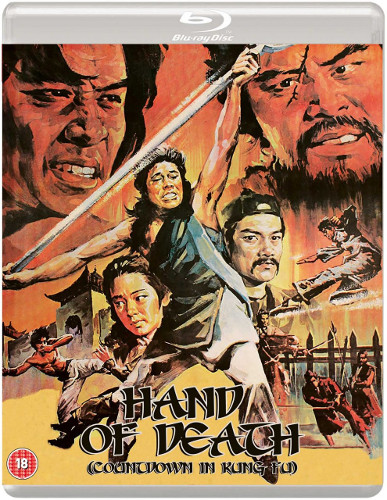
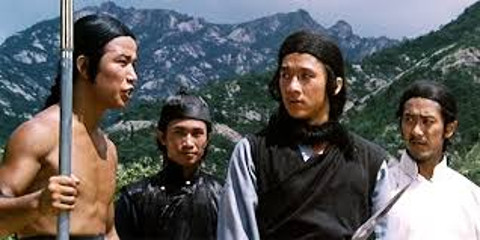


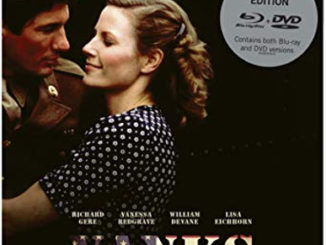
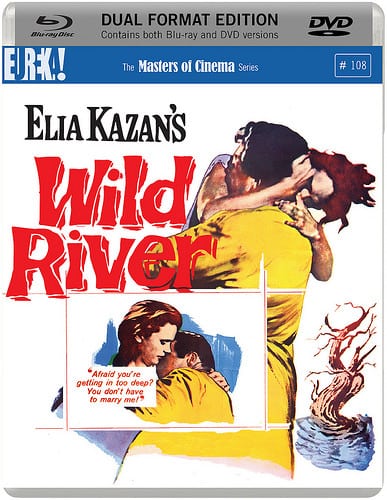
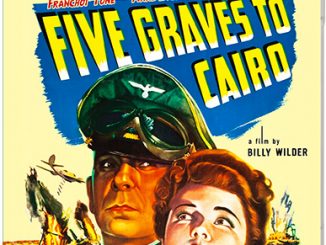
Be the first to comment